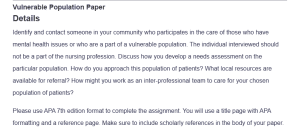Vulnerable Population Paper
Choosing the Appropriate Individual
For this assignment, I interviewed Sarah Johnson (pseudonym), a licensed social worker whose work specialty is crisis intervention and suicide prevention; she practices in Fort Payne, Alabama. Her rich experience in the mental health care field, more so in the handling of vulnerable populations, makes her an ideal source of information regarding this topic.
Development of Needs Assessment
In her concept for the needs assessment, Sarah introduced a multifaceted approach to the needs assessment for rural adult patients who have suicidal ideation. She does this first through confidential one-on-one interviews with the patient to identify their current mental status, the risk factors, and support systems. Standardized screening tools, like the Columbia-Suicide Severity Rating Scale, are used by her to objectively assess suicide risk. According to Sarah, information from family members, if available, is pertinent since it gives a fuller picture of the situation with the patient. In her evaluation, she takes into account rural-specific problems such as lack of access to mental health services, social isolation, and stigma associated with mental illness. She also keeps in mind other socioeconomic factors that facilitate her needs check, as well as the history of substance abuse and prior suicide attempts.
Approach to Patients
Sarah stresses the need to serve this vulnerable population in a safe and nonjudgmental fashion. She engages in active listening and uses empathy to gain the trust of her clients. The trauma-informed approach shows that she knows a patient might have gone through several traumas in their past, which have finally taken the shape of their present. As a nurse, my approach would somewhat be the same as I intend to build a rapport and trust with patients. Feeling heard and validated while maintaining a professional relationship means a lot to patients. I will also collaborate with patients in the development of a safety plan and include their support system as appropriate.
Local Resources
Fort Payne has a variety of local resources that are useful to individuals who have suicidal ideation and their providers. The DeKalb Crisis Center provides crisis intervention on a 24-hour basis, and Mountainview Hospital provides inpatient psychiatric care for those patients who may need a higher level of care. Further, the Northeast Alabama Community Mental Health Center provides counseling and medication management for patients requiring outpatient services, while the Alabama Suicide Prevention Resource Center offers training opportunities and resources to healthcare professionals. Additionally, the National Suicide Prevention Lifeline offers phone support to individuals in crisis 24 hours a day.
Interprofessional Collaboration
Rural adult patients who present with suicidal ideation will require interprofessional collaboration by all healthcare providers to provide effective care. As a nurse, I would work with social workers like Sarah to provide full psychosocial support. This would include contacting psychiatrists for medication and additional acute treatment plans. Primary care physicians would be contacted and utilized for other chronic health issues that would most likely contribute to the mental health concerns of patients. Community mental health agencies would be utilized to gain access to follow-up resources and support. Crisis intervention specialists would, therefore, be paramount in managing immediate risk. Open lines of communication and regular team meetings will facilitate coordination toward delivering care, hence, better patient outcomes (Johnson and Johnson, 2023; McLaney et al., 2022). Such an interprofessional approach will facilitate the pooling of expertise in delivering holistic care that addresses all complex issues amongst a vulnerable population.
References
Johnson and Johnson. (2023, September 11). The importance of interprofessional collaboration in healthcare. Discover Nursing. https://nursing.jnj.com/getting-real-nursing-today/the-importance-of-interprofessional-collaboration-in-healthcare
McLaney, E., Morassaei, S., Hughes, L., Davies, R., Campbell, M., & Prospero, L. D. (2022). A framework for interprofessional team collaboration in a hospital setting: Advancing team competencies and behaviours. Healthcare Management Forum, 35(2), 112–117. https://doi.org/10.1177/08404704211063584
ORDER A PLAGIARISM-FREE PAPER HERE
We’ll write everything from scratch
Question
Vulnerable Population Paper
Details
Identify and contact someone in your community who participates in the care of those who have mental health issues or who are a part of a vulnerable population. The individual interviewed should not be a part of the nursing profession. Discuss how you develop a needs assessment on the particular population. How do you approach this population of patients? What local resources are available for referral? How might you work as an inter-professional team to care for your chosen population of patients?

Vulnerable Population Paper
Please use APA 7th edition format to complete the assignment. You will use a title page with APA formatting and a reference page. Make sure to include scholarly references in the body of your paper.
Criteria Ratings Pts
- Chooses Appropriate Individual
- Development of Needs Assessment
- Approach to Patients
- Local Resources
- Interprofessional Collaboration
- Writing Style/APA

